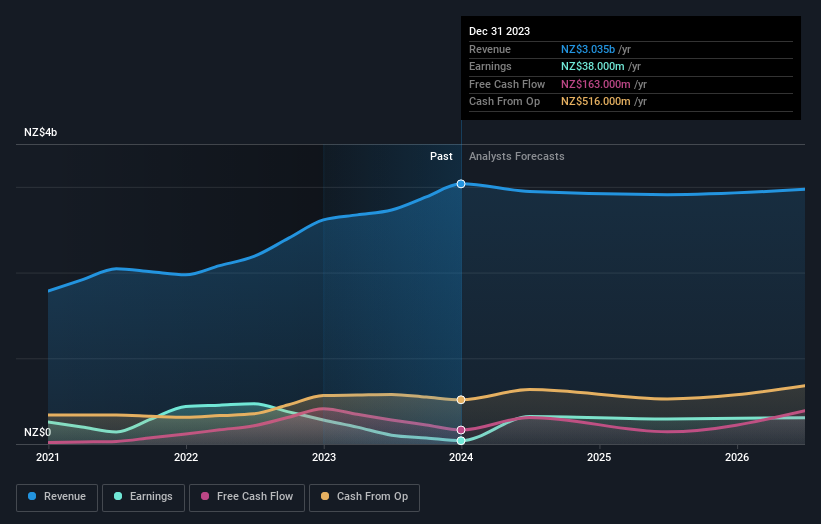Individual investors own 34% of Mercury NZ Limited (NZSE:MCY) shares but sovereign wealth funds control 51% of the company
Key Insights
The considerable ownership by sovereign wealth funds in Mercury NZ indicates that they collectively have a greater say in management and business strategy
New Zealand Superannuation Fund owns 51% of the company
If you want to know who really controls Mercury NZ Limited (NZSE:MCY), then you'll have to look at the makeup of its share registry. We can see that sovereign wealth funds own the lion's share in the company with 51% ownership. In other words, the group stands to gain the most (or lose the most) from their investment into the company.
Individual investors, on the other hand, account for 34% of the company's stockholders.
In the chart below, we zoom in on the different ownership groups of Mercury NZ.
View our latest analysis for Mercury NZ
What Does The Institutional Ownership Tell Us About Mercury NZ?
Institutions typically measure themselves against a benchmark when reporting to their own investors, so they often become more enthusiastic about a stock once it's included in a major index. We would expect most companies to have some institutions on the register, especially if they are growing.
We can see that Mercury NZ does have institutional investors; and they hold a good portion of the company's stock. This can indicate that the company has a certain degree of credibility in the investment community. However, it is best to be wary of relying on the supposed validation that comes with institutional investors. They too, get it wrong sometimes. When multiple institutions own a stock, there's always a risk that they are in a 'crowded trade'. When such a trade goes wrong, multiple parties may compete to sell stock fast. This risk is higher in a company without a history of growth. You can see Mercury NZ's historic earnings and revenue below, but keep in mind there's always more to the story.
Hedge funds don't have many shares in Mercury NZ. Looking at our data, we can see that the largest shareholder is New Zealand Superannuation Fund with 51% of shares outstanding. With such a huge stake in the ownership, we infer that they have significant control of the future of the company. JPMorgan Chase & Co, Private Banking and Investment Banking Investments is the second largest shareholder owning 3.2% of common stock, and The Vanguard Group, Inc. holds about 1.9% of the company stock.
While it makes sense to study institutional ownership data for a company, it also makes sense to study analyst sentiments to know which way the wind is blowing. There are a reasonable number of analysts covering the stock, so it might be useful to find out their aggregate view on the future.
Insider Ownership Of Mercury NZ
The definition of company insiders can be subjective and does vary between jurisdictions. Our data reflects individual insiders, capturing board members at the very least. Company management run the business, but the CEO will answer to the board, even if he or she is a member of it.
Most consider insider ownership a positive because it can indicate the board is well aligned with other shareholders. However, on some occasions too much power is concentrated within this group.
Our most recent data indicates that insiders own less than 1% of Mercury NZ Limited. It is a pretty big company, so it would be possible for board members to own a meaningful interest in the company, without owning much of a proportional interest. In this case, they own around NZ$5.6m worth of shares (at current prices). Arguably, recent buying and selling is just as important to consider. You can click here to see if insiders have been buying or selling.
General Public Ownership
With a 34% ownership, the general public, mostly comprising of individual investors, have some degree of sway over Mercury NZ. While this size of ownership may not be enough to sway a policy decision in their favour, they can still make a collective impact on company policies.
Next Steps:
I find it very interesting to look at who exactly owns a company. But to truly gain insight, we need to consider other information, too. Take risks for example - Mercury NZ has 4 warning signs (and 1 which is significant) we think you should know about.
If you are like me, you may want to think about whether this company will grow or shrink. Luckily, you can check this free report showing analyst forecasts for its future.
NB: Figures in this article are calculated using data from the last twelve months, which refer to the 12-month period ending on the last date of the month the financial statement is dated. This may not be consistent with full year annual report figures.
Have feedback on this article? Concerned about the content? Get in touch with us directly. Alternatively, email editorial-team (at) simplywallst.com.
This article by Simply Wall St is general in nature. We provide commentary based on historical data and analyst forecasts only using an unbiased methodology and our articles are not intended to be financial advice. It does not constitute a recommendation to buy or sell any stock, and does not take account of your objectives, or your financial situation. We aim to bring you long-term focused analysis driven by fundamental data. Note that our analysis may not factor in the latest price-sensitive company announcements or qualitative material. Simply Wall St has no position in any stocks mentioned.

 Yahoo Finance
Yahoo Finance 

